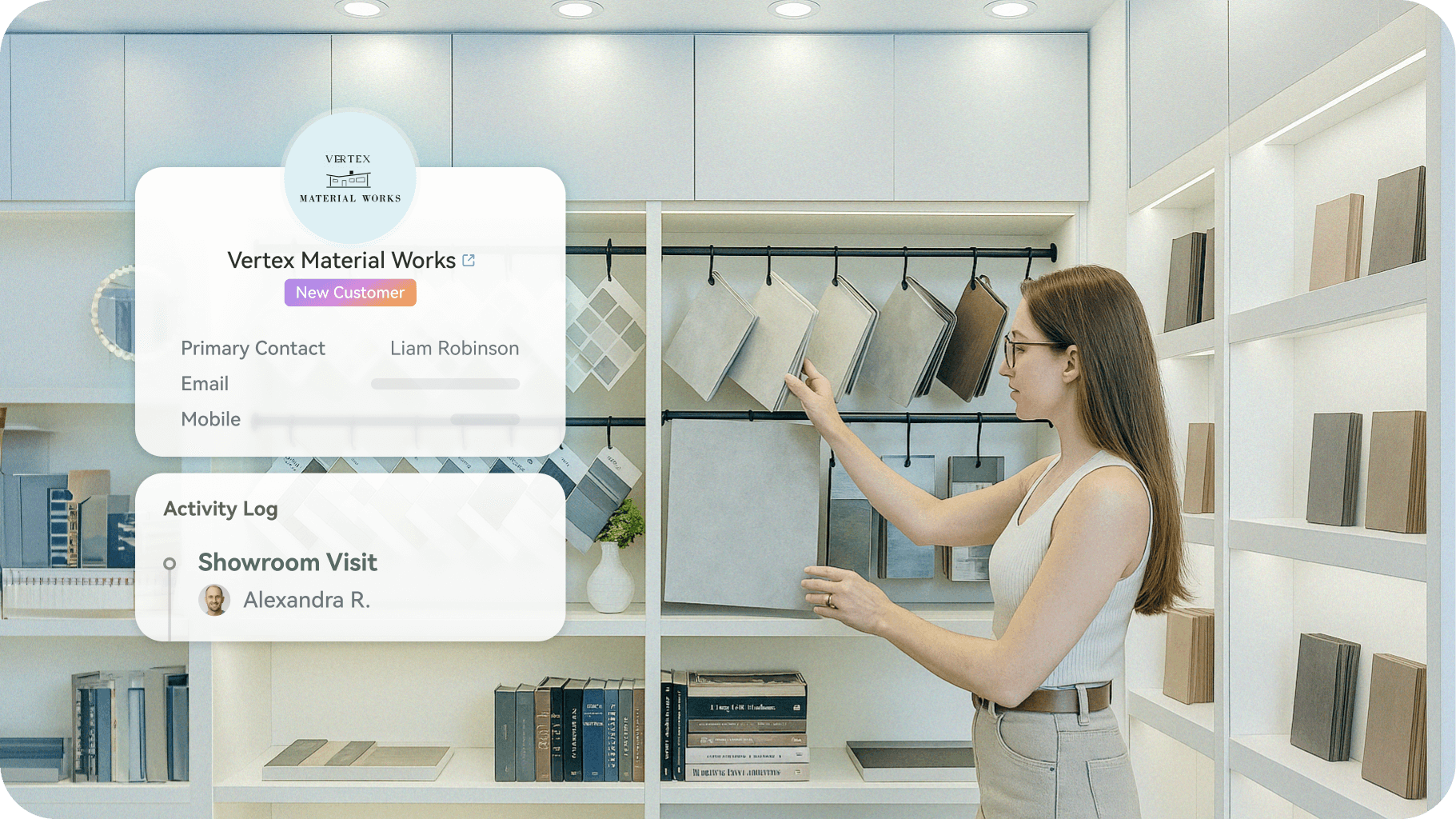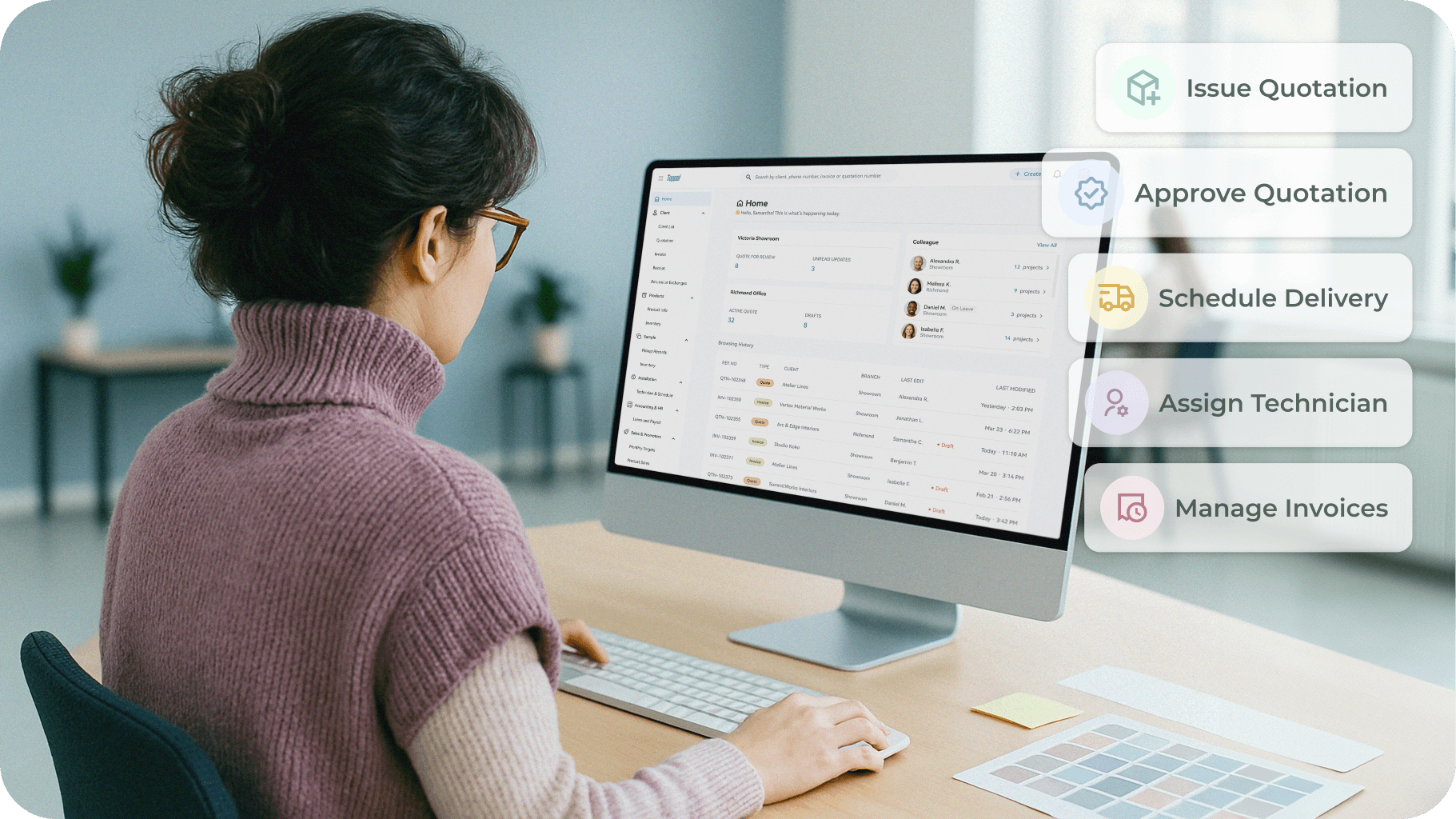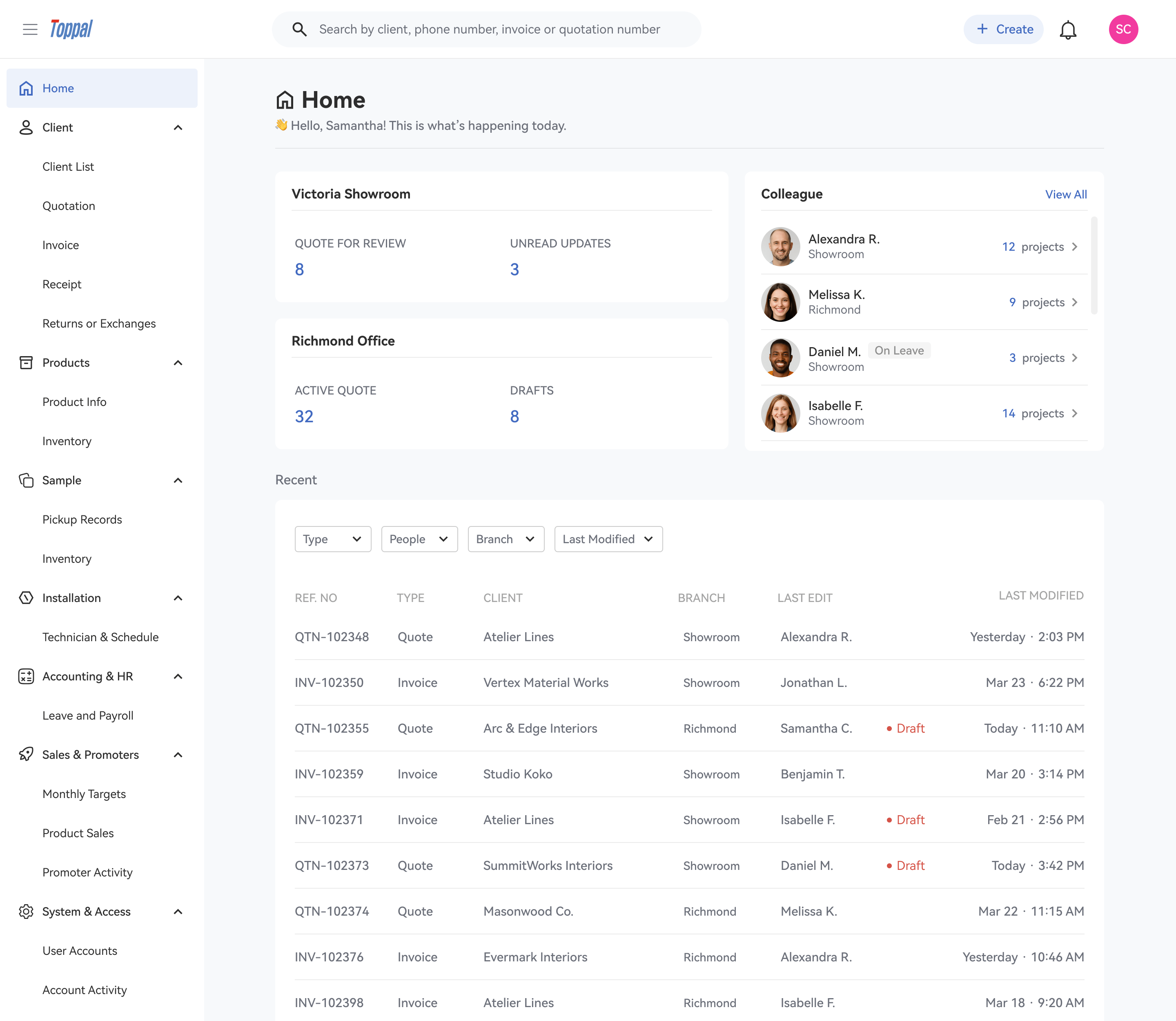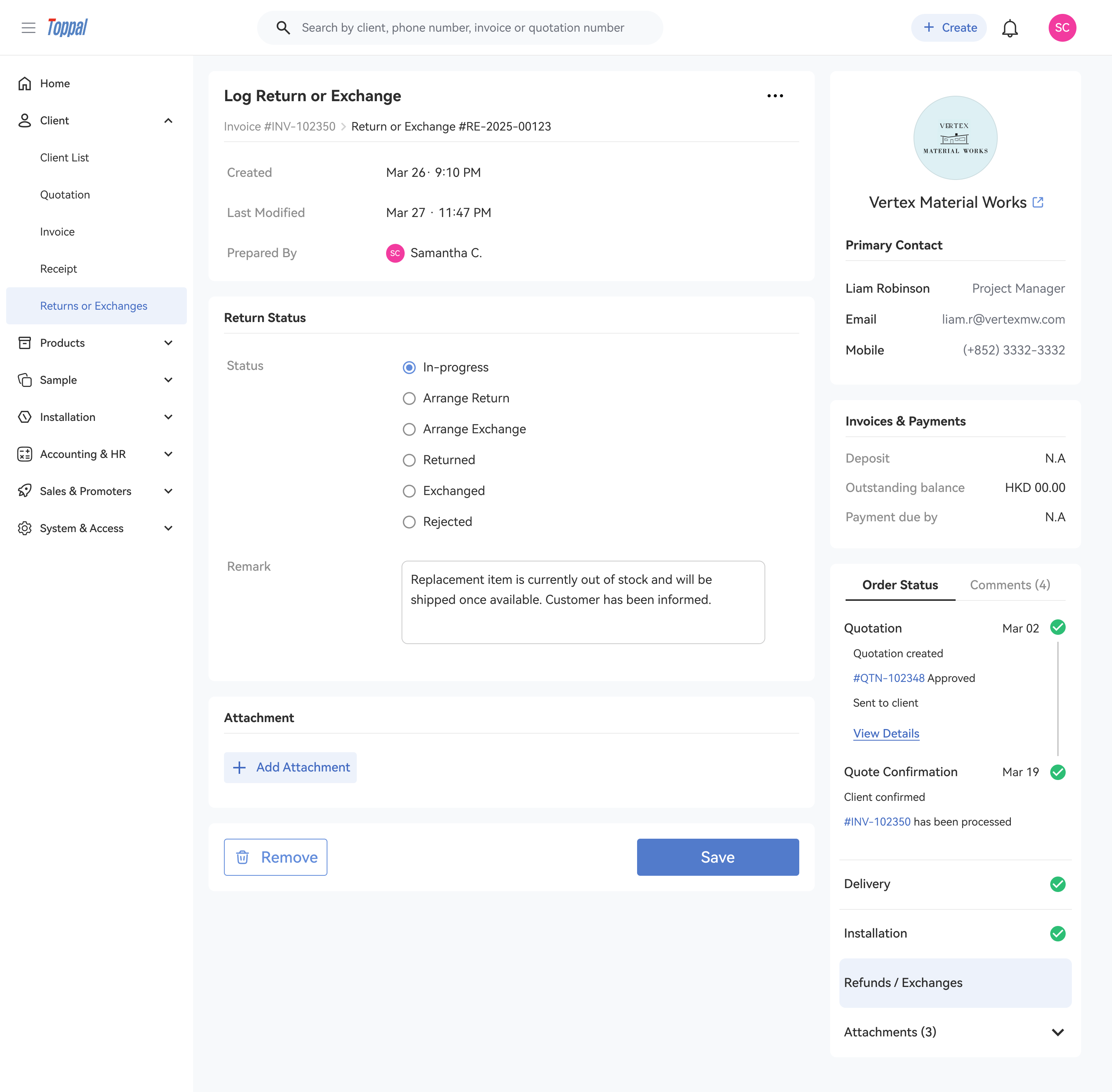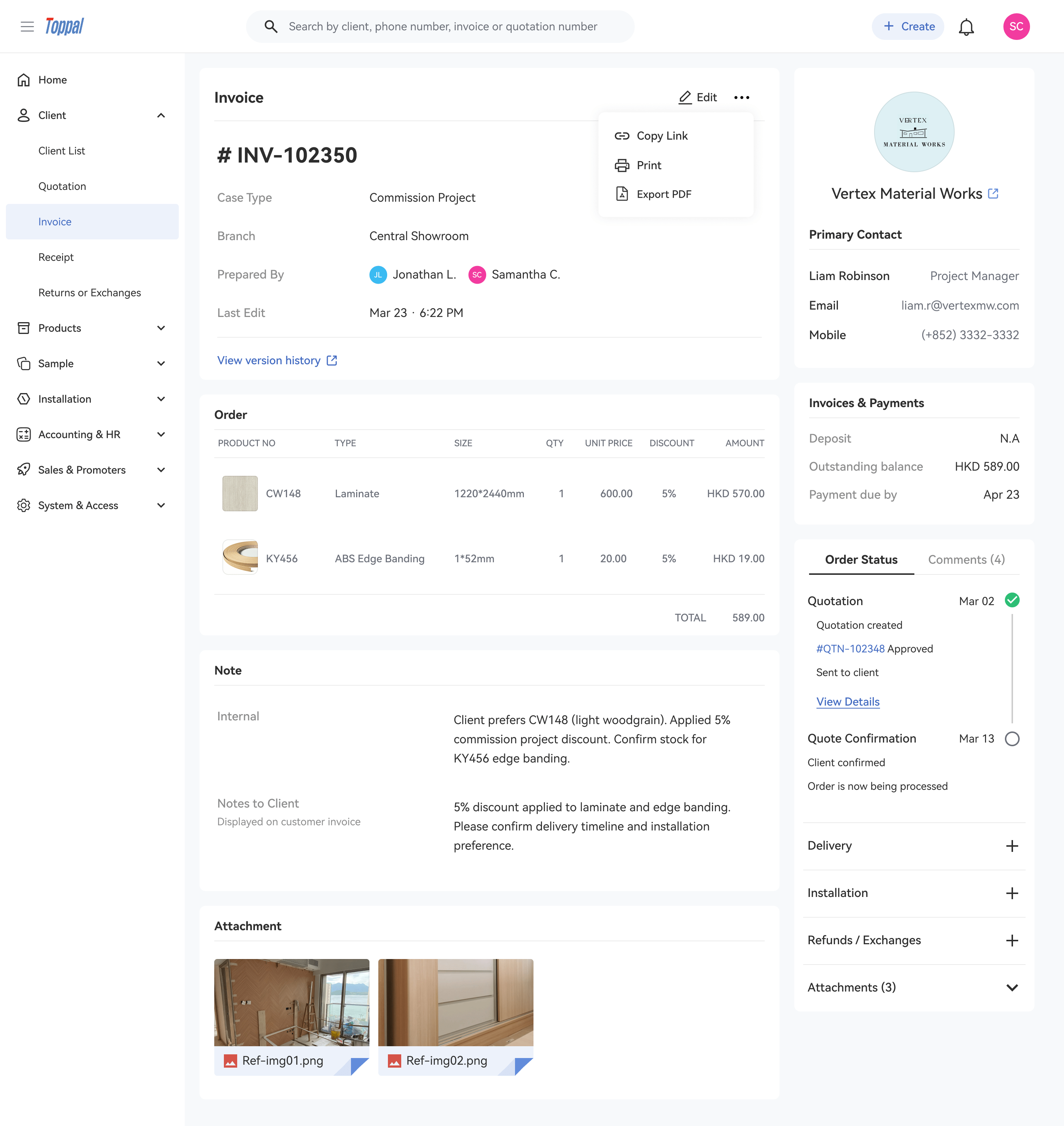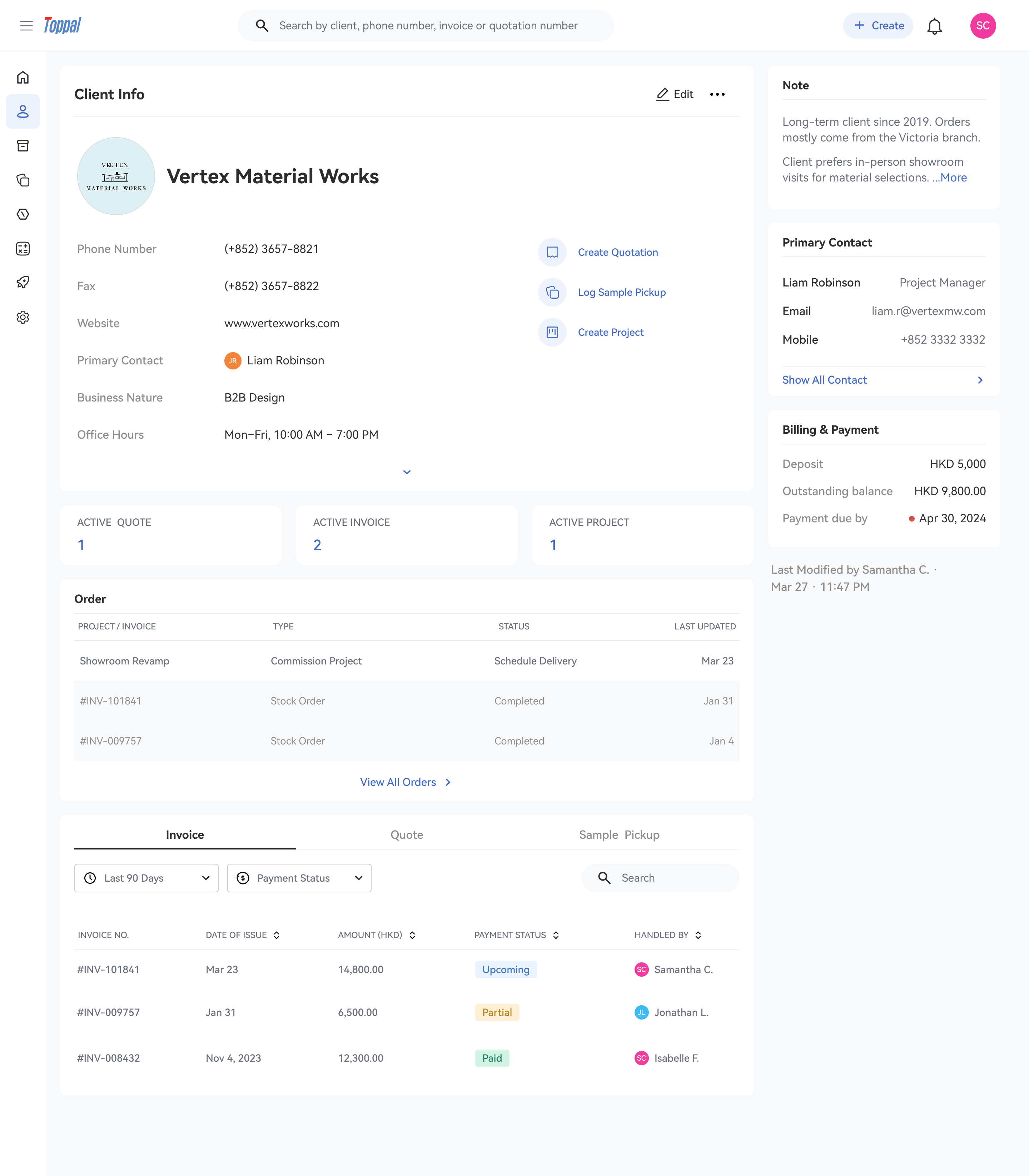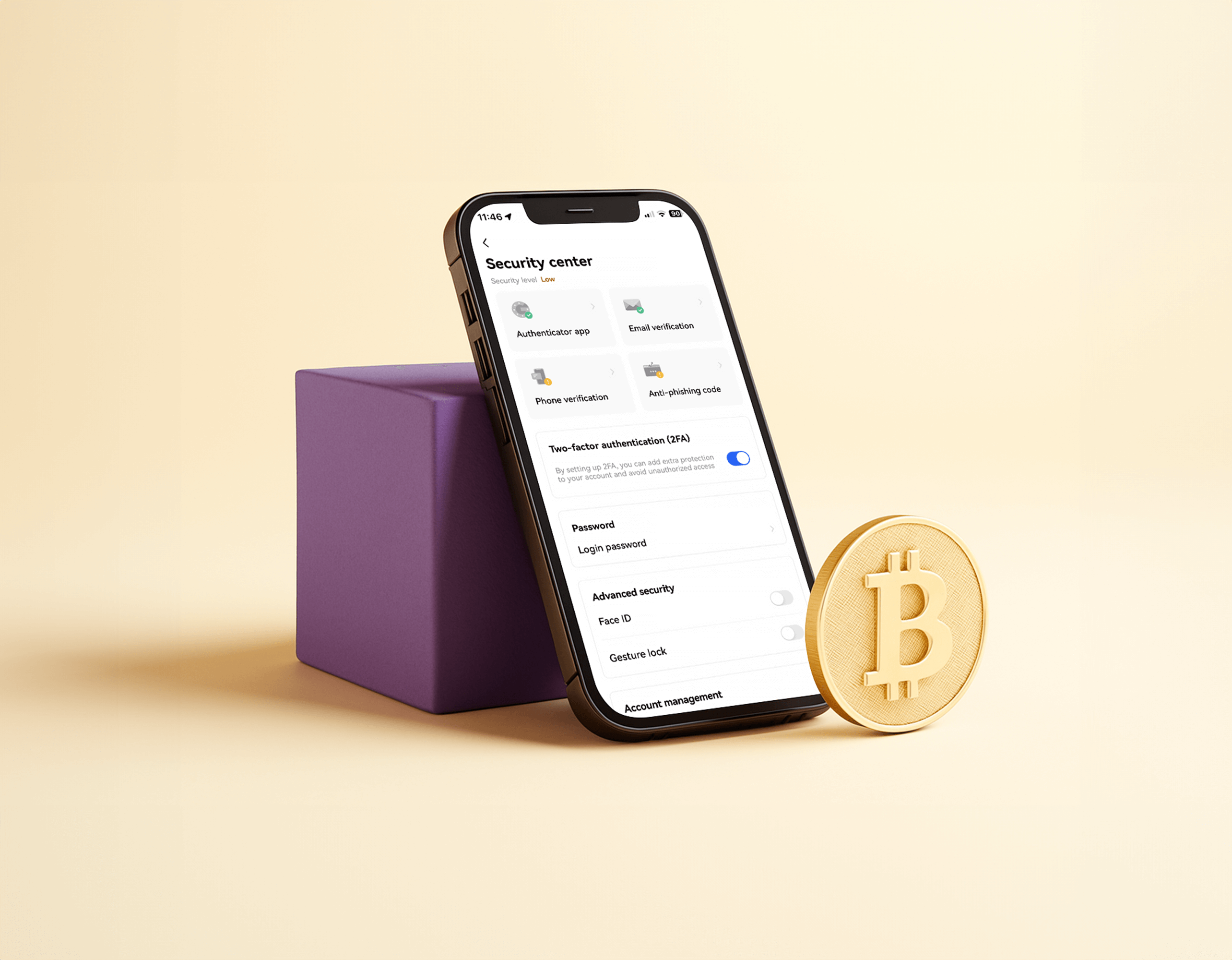Building an All-in-One Tool for Interior Suppliers

Toppal, a B2B furniture materials supplier, faced growing inefficiencies as teams relied on fragmented tools and manual coordination. Misaligned responsibilities between showroom and back office staff were slowing operations and affecting service quality.
Through site visits and stakeholder interviews, I mapped the full journey—from client visits, quotation, and ordering to installation, invoicing, and returns—and designed a centralized portal to streamline communication, clarify task ownership, and improve real-time visibility across teams.
Toppal, a B2B furniture materials supplier, faced growing inefficiencies as teams relied on fragmented tools and manual coordination. Misaligned responsibilities between showroom and back office staff were slowing operations and affecting service quality.
Through site visits and stakeholder interviews, I mapped the full journey—from client visits, quotation, and ordering to installation, invoicing, and returns—and designed a centralized portal to streamline communication, clarify task ownership, and improve real-time visibility across teams.
Toppal, a B2B furniture materials supplier, faced growing inefficiencies as teams relied on fragmented tools and manual coordination. Misaligned responsibilities between showroom and back office staff were slowing operations and affecting service quality.
Through site visits and stakeholder interviews, I mapped the full journey—from client visits, quotation, and ordering to installation, invoicing, and returns—and designed a centralized portal to streamline communication, clarify task ownership, and improve real-time visibility across teams.
Toppal, a B2B furniture materials supplier, faced growing inefficiencies as teams relied on fragmented tools and manual coordination. Misaligned responsibilities between showroom and back office staff were slowing operations and affecting service quality.
Through site visits and stakeholder interviews, I mapped the full journey—from client visits, quotation, and ordering to installation, invoicing, and returns—and designed a centralized portal to streamline communication, clarify task ownership, and improve real-time visibility across teams.
Toppal, a B2B furniture materials supplier, faced growing inefficiencies as teams relied on fragmented tools and manual coordination. Misaligned responsibilities between showroom and back office staff were slowing operations and affecting service quality.
Through site visits and stakeholder interviews, I mapped the full journey—from client visits, quotation, and ordering to installation, invoicing, and returns—and designed a centralized portal to streamline communication, clarify task ownership, and improve real-time visibility across teams.
IMPACT ■
- 45% time
Spent on internal coordination
+ 60% faster
Access to quotation and invoice status
- 30% fewer
- 30% fewer
Order-related errors
CUSTOMER PAINPOINT ■
CUSTOMER PAINPOINT ■
CUSTOMER PAINPOINT ■
CUSTOMER PAINPOINT ■
CUSTOMER PAINPOINT ■
This service blueprint was built from on-site observations and stakeholder interviews to capture how work actually flowed across teams—from initial visits to post-sale resolution. It revealed where breakdowns in communication, tracking, and coordination were slowing things down.
The diagram provides a clear view of how those issues played out at each stage, guiding the next steps in defining system requirements and design priorities.
This service blueprint was built from on-site observations and stakeholder interviews to capture how work actually flowed across teams—from initial visits to post-sale resolution. It revealed where breakdowns in communication, tracking, and coordination were slowing things down.
The diagram provides a clear view of how those issues played out at each stage, guiding the next steps in defining system requirements and design priorities.
This service blueprint was built from on-site observations and stakeholder interviews to capture how work actually flowed across teams—from initial visits to post-sale resolution. It revealed where breakdowns in communication, tracking, and coordination were slowing things down.
The diagram provides a clear view of how those issues played out at each stage, guiding the next steps in defining system requirements and design priorities.
This service blueprint was built from on-site observations and stakeholder interviews to capture how work actually flowed across teams—from initial visits to post-sale resolution. It revealed where breakdowns in communication, tracking, and coordination were slowing things down.
The diagram provides a clear view of how those issues played out at each stage, guiding the next steps in defining system requirements and design priorities.
This service blueprint was built from on-site observations and stakeholder interviews to capture how work actually flowed across teams—from initial visits to post-sale resolution. It revealed where breakdowns in communication, tracking, and coordination were slowing things down.
The diagram provides a clear view of how those issues played out at each stage, guiding the next steps in defining system requirements and design priorities.
These operational challenges, revealed through on-site observations and stakeholder interviews, directly shaped the mission statement and sparked 'How Might We' brainstorming sessions to explore potential solutions for these service gaps.
These operational challenges, revealed through on-site observations and stakeholder interviews, directly shaped the mission statement and sparked 'How Might We' brainstorming sessions to explore potential solutions for these service gaps.
These operational challenges, revealed through on-site observations and stakeholder interviews, directly shaped the mission statement and sparked 'How Might We' brainstorming sessions to explore potential solutions for these service gaps.
These operational challenges, revealed through on-site observations and stakeholder interviews, directly shaped the mission statement and sparked 'How Might We' brainstorming sessions to explore potential solutions for these service gaps.
These operational challenges, revealed through on-site observations and stakeholder interviews, directly shaped the mission statement and sparked 'How Might We' brainstorming sessions to explore potential solutions for these service gaps.
MISSION STATEMENT ■
Bringing clarity, traceability, and accountability to workflows — improving service and reducing operational risks.
💬 How might we…
Reduce repetitive tasks and make it easier for staff to log, share, and follow up on customer requests?
💬 How might we…
Make information accessible without the follow-up hassle?
💬 How might we…
Give managers better visibility — so they can oversee operations with confidence?
SOLUTION ■
Centralize Customer Information to Strengthen Team Alignment
Centralize Customer Information to Strengthen Team Alignment
Centralize Customer Information to Strengthen Team Alignment
Centralize Customer Information to Strengthen Team Alignment
Streamline Client Records
Bring contact details, visit logs, and payment status together — reducing back-and-forth and keeping everyone aligned.
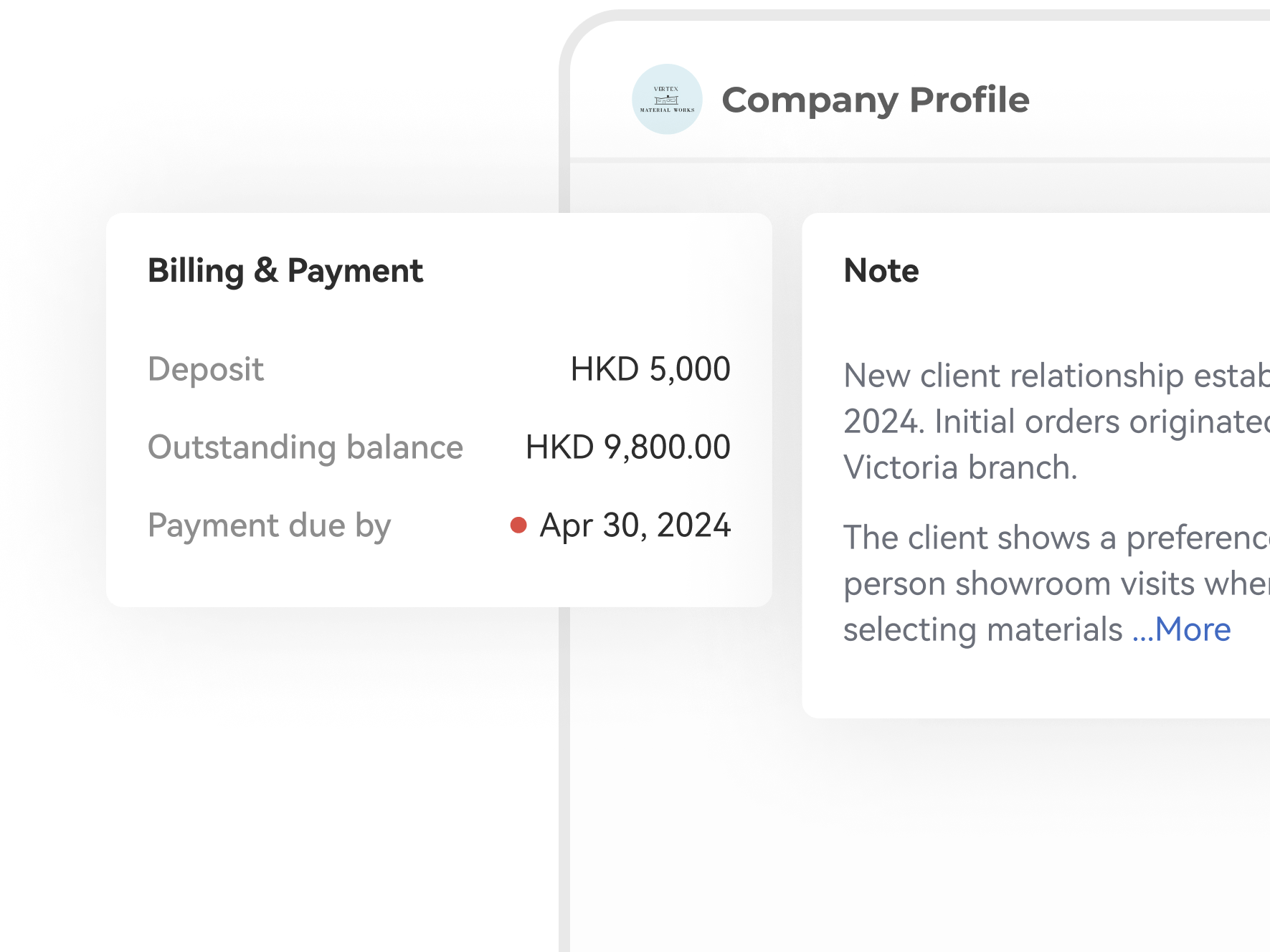
Keep Communication in Context
Tag teammates, share files, and keep conversations organized—no more scattered chats or missed updates.
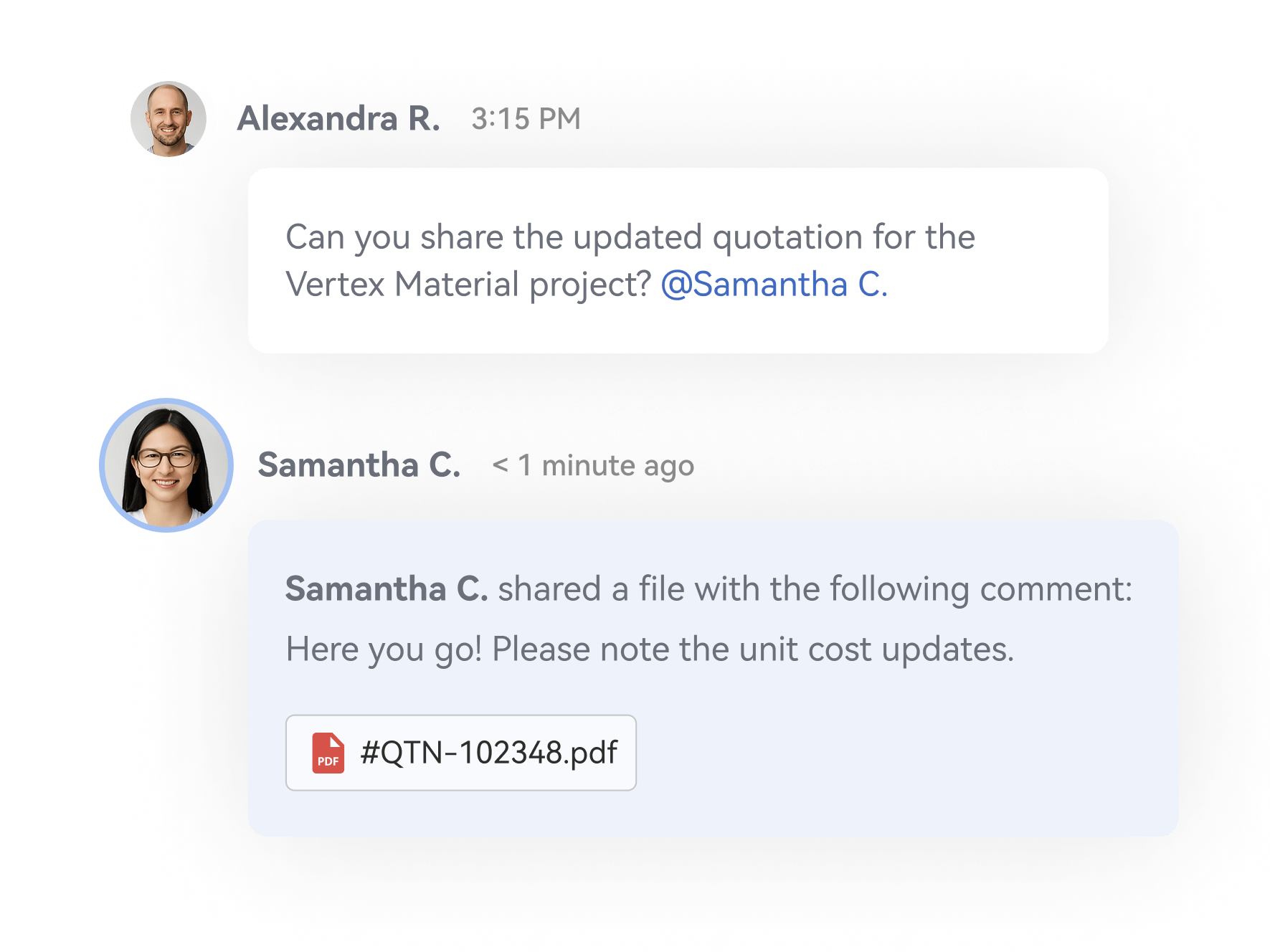
Make Sales & Fulfillment Fully Transparent
Make Sales & Fulfillment Fully Transparent
Make Sales & Fulfillment Fully Transparent
Make Sales & Fulfillment Fully Transparent
Track Every Step with Confidence
Stay aligned with a clear view of order progress—from quotation to delivery, installation, and refunds—all in one place.
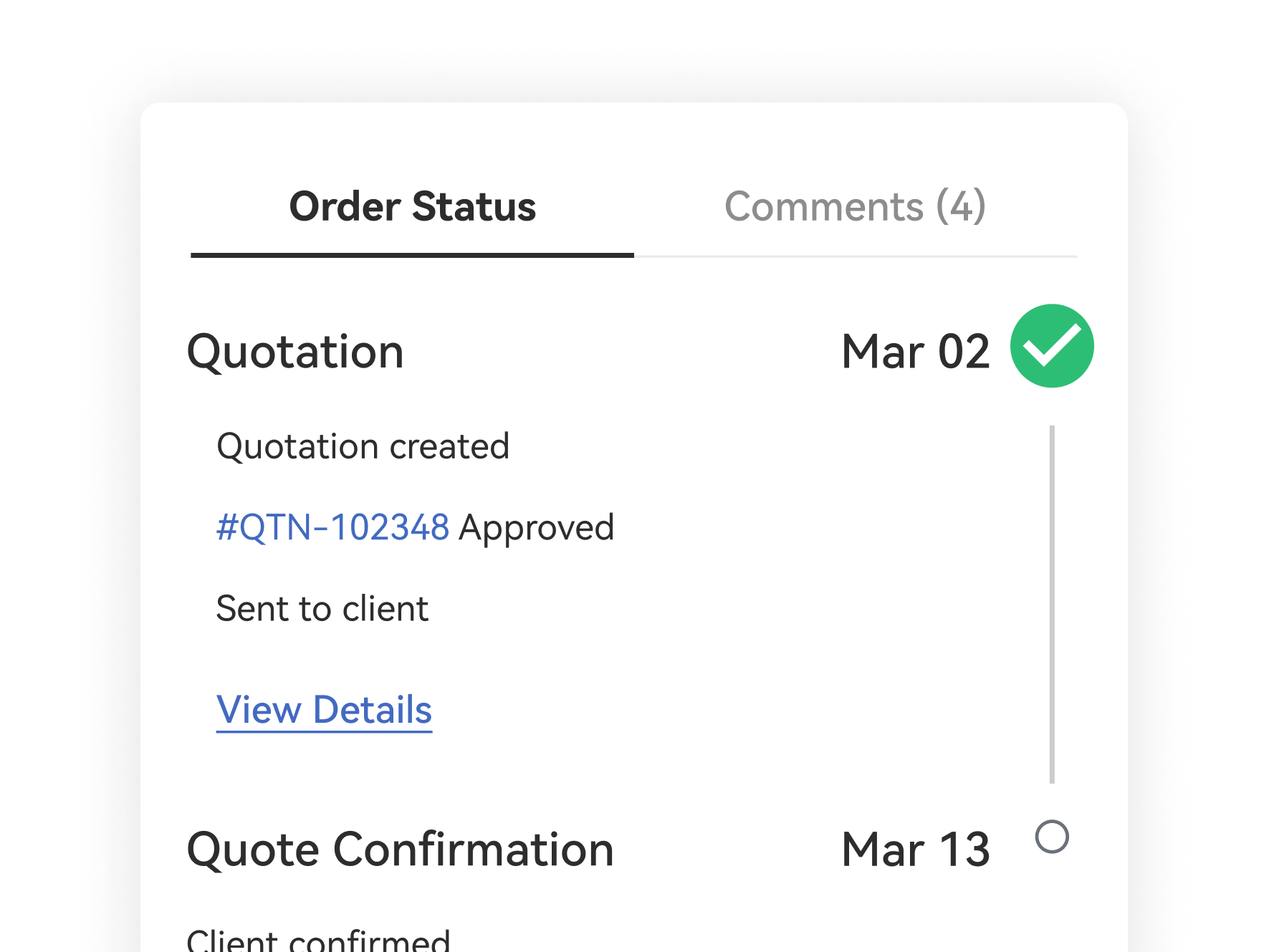
Speed Up Daily Tasks
Save time on repetitive tasks with one-click shortcuts from the dashboard — reducing unnecessary steps and helping teams focus on what matters most.
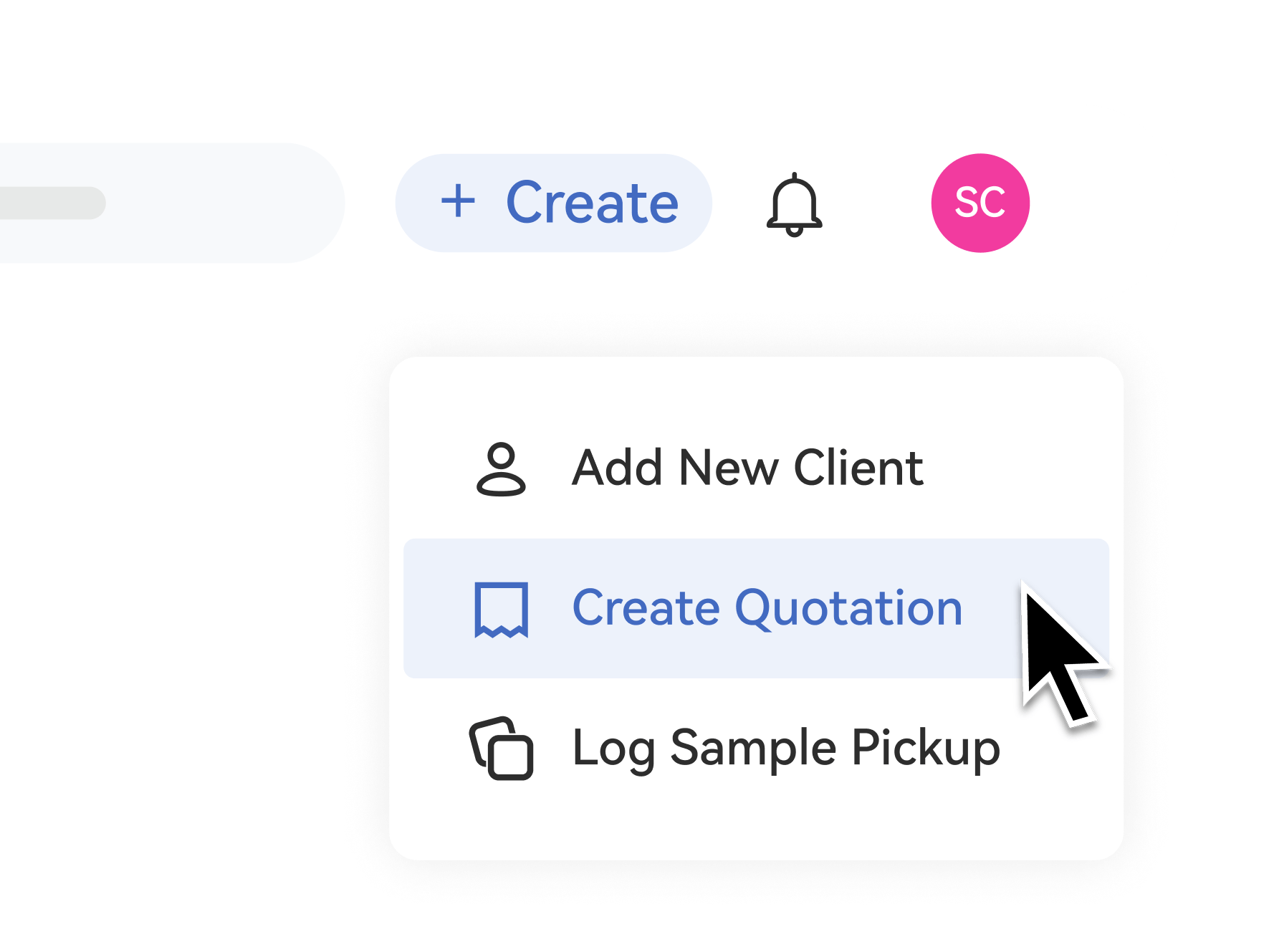
Manage Everything in One Place
Manage Everything in One Place
Manage Everything in One Place
Manage Everything in One Place
Get Real-Time Visibility into Key Updates
Whether it’s payments, deliveries, or approvals, get instant status updates to keep work moving.

Replace Tool Chaos with a Unified Workspace
No more switching between tools—centralize work in a single platform built for clarity and efficiency.
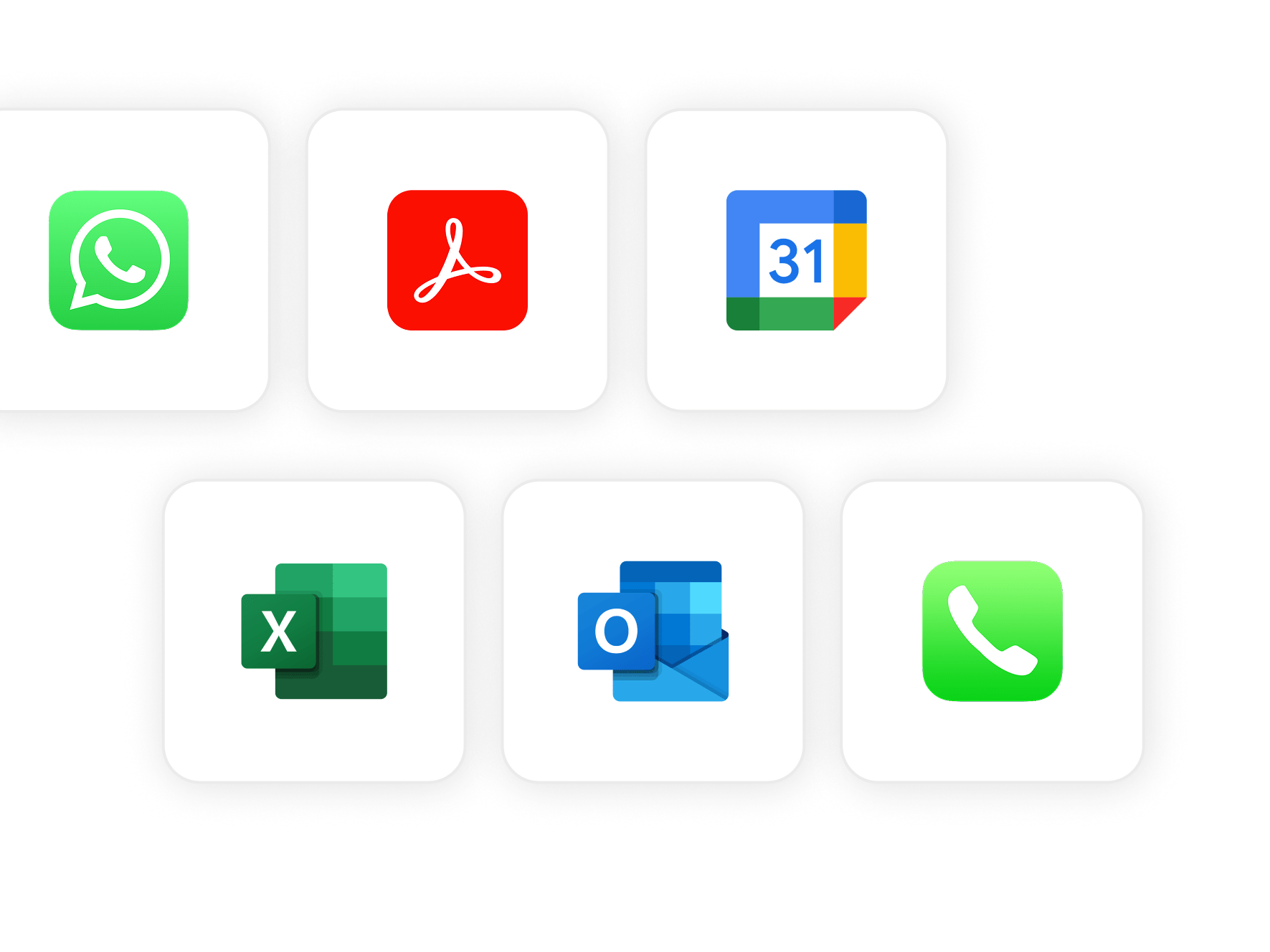
REFLECTIONS ■
Expose Hidden Friction Through Contextual Discovery
On-site observation revealed workflow gaps missed in interviews, allowing design to target the highest-impact problems. This approach was later echoed by the team, who recognized how the process surfaced inefficiencies they hadn’t fully seen before.
Design for Adoption by Aligning with Existing Operations
By building around familiar practices, I reduced resistance, sped up onboarding, and delivered value from day one. Teams found the system intuitive from the start, noting how it fit naturally into their daily routines without the need for extensive training.


